Ditapis dengan
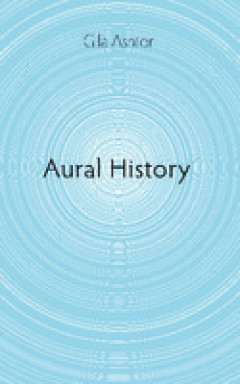
Aural history
Aural History is an anti-memoir memoir of encountering devastating grief that uses experimental storytelling to recreate the winding, fractured path of loss and transformation.Written by a thirty-something psychotherapist and queer theorist, Aural History is structured as a sequence of three sections that each use different narrative styles to represent a distinctive stage in the protagonist’…
- Edisi
- -
- ISBN/ISSN
- 9781950192670
- Deskripsi Fisik
- 324 p.; 22 cm.
- Judul Seri
- -
- No. Panggil
- 155.413 ASh a
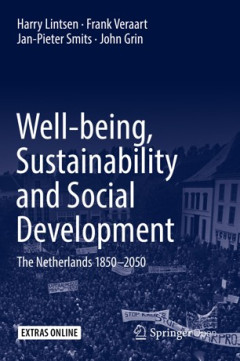
Well-being, Sustainability and Social Development :The Netherlands 1850–2050
This open access book examines more than two centuries of societal development using novel historical and statistical approaches. It applies the well-being monitor developed by Statistics Netherlands that has been endorsed by a significant part of the international, statistical community. It features The Netherlands as a case study, which is an especially interesting example; although it wa…
- Edisi
- -
- ISBN/ISSN
- 9783319766966
- Deskripsi Fisik
- xxxii, 572p. : ill.
- Judul Seri
- -
- No. Panggil
- 113 WEL w
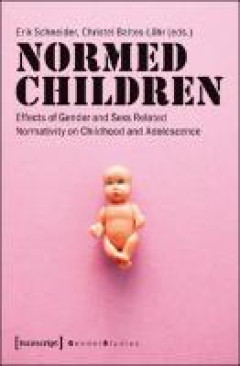
Normed children:effects of gender and sex related normativity on childhood a…
Gender- and sex-related norms have an impact on us from the first to the last day of our lives. What are the effects of such norms on the education of children and adolescents? Conveyed via parents/family, school, and peers, they seem to be an inseparable part of human relations. After its favorable reception in German-speaking countries from 2014 onwards, this title is now available in English…
- Edisi
- -
- ISBN/ISSN
- 9783839430200
- Deskripsi Fisik
- 370 p.; 22 cm.
- Judul Seri
- -
- No. Panggil
- 155.43 NOR n

Anti-vivisection and the profession of medicine in Britain :a social history
This book explores the social history of the anti-vivisection movement in Britain from its nineteenth-century beginnings until the 1960s. It discusses the ethical principles that inspired the movement and the socio-political background that explains its rise and fall. Opposition to vivisection began when medical practitioners complained it was contrary to the compassionate ethos of their profes…
- Edisi
- -
- ISBN/ISSN
- 9781137556974
- Deskripsi Fisik
- xxi, 217p. : ill.
- Judul Seri
- -
- No. Panggil
- 179.4 BAT a
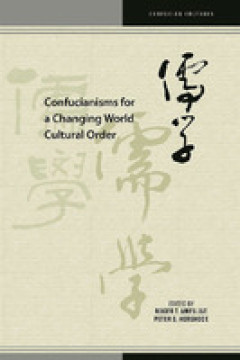
Confucianisms for a changing world cultural orde
The rise of Asia has precipitated a dramatic sea change in the world’s economic and political orders, and deepening global predicaments, including climate change, migration, and increasing inequalities of wealth and opportunity, pose new challenges. This book critically explores how the pan-Asian phenomenon of Confucianism offers alternative values and depths of ethical commitment that cross …
- Edisi
- -
- ISBN/ISSN
- 9780824872588
- Deskripsi Fisik
- 269 p.; 22 cm.
- Judul Seri
- -
- No. Panggil
- 181.11 CON c

Dignity in the 21st century :Middle East and West
This book offers a unique and insightful analysis of Western and Middle Eastern concepts of dignity and illustrates them with examples of everyday life. Dignity in the 21st Century - Middle East and West is unique and insightful for a range of reasons. First, the book is co-authored by scholars from two different cultures (Middle East and West). As a result, the interpretations of dignity cove…
- Edisi
- -
- ISBN/ISSN
- 9783319580203
- Deskripsi Fisik
- xiii, 101p. : ill.
- Judul Seri
- -
- No. Panggil
- 179.9 SCH d
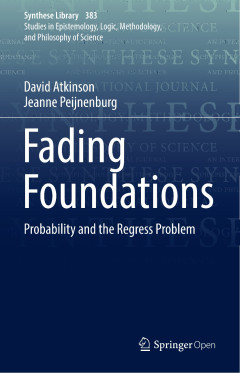
Fading foundations :probability and the regress problem
This book addresses the age-old problem of infinite regresses in epistemology. How can we ever come to know something if knowing requires having good reasons, and reasons can only be good if they are backed by good reasons in turn? The problem has puzzled philosophers ever since antiquity, giving rise to what is often called Agrippa's Trilemma. The current volume approaches the old problem in a…
- Edisi
- -
- ISBN/ISSN
- 9783319582955
- Deskripsi Fisik
- xi, 238p. : ill.
- Judul Seri
- -
- No. Panggil
- 121 ATK f
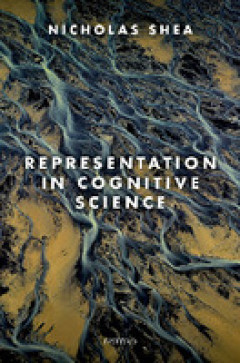
Representation in cognitive science
"Our thoughts are meaningful. We think about things in the outside world; how can that be so? This is one of the deepest questions in contemporary philosophy. Ever since the 'cognitive revolution', states with meaning-mental representations-have been the key explanatory construct of the cognitive sciences. But there is still no widely accepted theory of how mental representations get their mean…
- Edisi
- -
- ISBN/ISSN
- 9780198812883
- Deskripsi Fisik
- xi, 292 pages : illustrations ; 24 cm
- Judul Seri
- -
- No. Panggil
- 153 SHE r
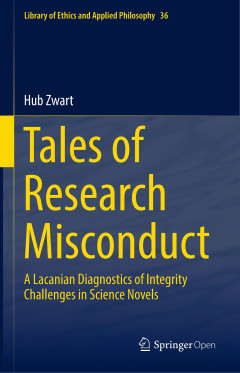
Tales of research misconduct :a Lacanian diagnostics of integrity challenges …
This monograph contributes to the scientific misconduct debate from an oblique perspective, by analysing seven novels devoted to this issue, namely: Arrowsmith by Sinclair Lewis (1925), The affair by C.P. Snow (1960), Cantor’s Dilemma by Carl Djerassi (1989), Perlmann’s Silence by Pascal Mercier (1995), Intuition by Allegra Goodman (2006), Solar by Ian McEwan (2010) and Derailment by Died…
- Edisi
- -
- ISBN/ISSN
- 9783319655543
- Deskripsi Fisik
- ix, 263p. : ill.
- Judul Seri
- -
- No. Panggil
- 174.95 ZWA t
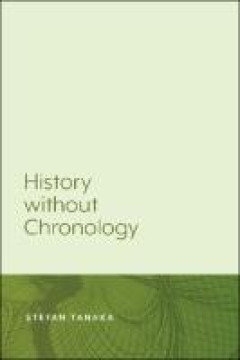
History without chronology
Although numerous disciplines recognize multiple ways of conceptualizing time, Stefan Tanaka argues that scholars still overwhelmingly operate on chronological and linear Newtonian or classical time that emerged during the Enlightenment. This short, approachable book implores the humanities and humanistic social sciences to actively embrace the richness of different times that are evident in no…
- Edisi
- -
- ISBN/ISSN
- 9781643150048
- Deskripsi Fisik
- XIV, 202 p.
- Judul Seri
- -
- No. Panggil
- 115 TAN h

Free will, causality, and neuroscience
Neuroscientists often consider free will to be an illusion. Contrary to this hypothesis, the contributions to this volume show that recent developments in neuroscience can also support the existence of free will. Firstly, the possibility of intentional consciousness is studied. Secondly, Libet’s experiments are discussed from this new perspective. Thirdly, the relationship between free will, …
- Edisi
- -
- ISBN/ISSN
- 9789004409965
- Deskripsi Fisik
- viii, 184p. : ill.
- Judul Seri
- -
- No. Panggil
- 123.5 FRE f
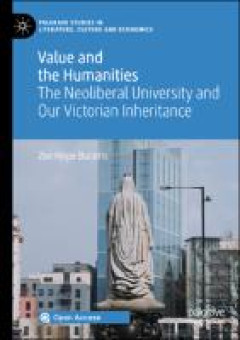
Value and the humanities the neoliberal university and our victorian inheritance
Tracing the shift from liberal to neoliberal education from the nineteenth century to the present day, this open access book provides a rich and previously underdeveloped narrative of value in higher education in England. Value and the Humanities draws upon historical, financial, and critical debates concerning educational and cultural policy. Rather than writing a singular defence of the human…
- Edisi
- -
- ISBN/ISSN
- 9783030378929
- Deskripsi Fisik
- 255 p.; 22 cm.
- Judul Seri
- -
- No. Panggil
- 171.2 VAL v

Public Policy:Why ethics matters
Ethics is a vigorously contested field. There are many competing moral frameworks, and different views about how normative considerations should inform the art and craft of governmental policy making. What is not in dispute, however, is that ethics matters. The ethical framework adopted by policy analysts and decision makers not only shapes how policy problems are defined, framed and analysed, …
- Edisi
- -
- ISBN/ISSN
- 9781921666759
- Deskripsi Fisik
- -
- Judul Seri
- -
- No. Panggil
- 170 BOS p
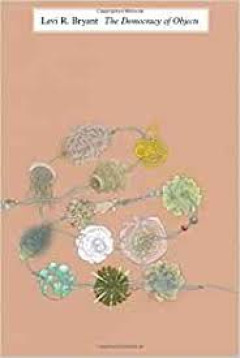
The democracy of objects
In The Democracy of Objects Bryant proposes that we break with the epistemological tradition and once again initiate the project of ontology as first philosophy. Bryant develops a realist ontology, called -onticology-, which argues that being is composed entirely of objects, properties, and relations. Bryant proposes that objects are dynamic systems that relate to the world under conditions of …
- Edisi
- -
- ISBN/ISSN
- 9781607852049
- Deskripsi Fisik
- 1 online resource
- Judul Seri
- -
- No. Panggil
- 150.92 LEV d

Why be moral?
What reasons do we have to be moral, and are these reasons more compelling than the reasons we have to pursue non-moral projects? Ever since the Sophists first raised this question, it has been a focal point of debate. Why be Moral? is a collection of new essays on this fundamental philosophical problem, written by an international team of leading scholars in the field.
- Edisi
- -
- ISBN/ISSN
- 9783110366396
- Deskripsi Fisik
- VIII, 278 p.
- Judul Seri
- -
- No. Panggil
- 170 WHY w
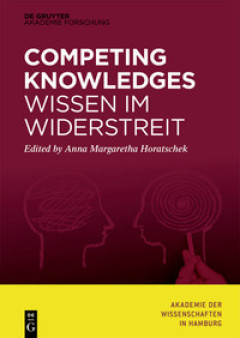
Competing knowledges – wissen im widerstreit
Whatever societies accept as ‘knowledge’ is embedded in epistemological, institutional, political, and economic power relations. How is knowledge produced under such circumstances? What is the difference between general knowledge and the sciences? Can there be science without universal truth claims? Questions like these are discussed in eleven essays from the perspective of Sociology, Law, …
- Edisi
- -
- ISBN/ISSN
- 9783110659658
- Deskripsi Fisik
- X, 220 p.
- Judul Seri
- -
- No. Panggil
- 121 COM c

Competing knowledges – wissen im widerstreit
Whatever societies accept as ‘knowledge’ is embedded in epistemological, institutional, political, and economic power relations. How is knowledge produced under such circumstances? What is the difference between general knowledge and the sciences? Can there be science without universal truth claims? Questions like these are discussed in eleven essays from the perspective of Sociology, Law, …
- Edisi
- -
- ISBN/ISSN
- 9783110659658
- Deskripsi Fisik
- X, 220 p.
- Judul Seri
- -
- No. Panggil
- 121 COM c
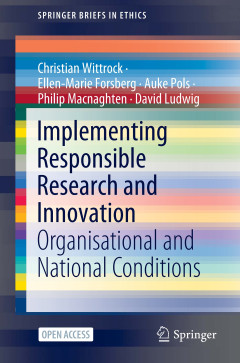
Implementing responsible research and innovation :organisational and national…
The book is an analysis of data collected in the RRI-Practice study. It comprises an organizational analysis and an analysis of national discourses, thus analysing conditions for the uptake of RRI in research funding and research performing organisations in the science system.
- Edisi
- -
- ISBN/ISSN
- 9783030578503
- Deskripsi Fisik
- xix, 120p. : ill.
- Judul Seri
- -
- No. Panggil
- 174.95 IMP i
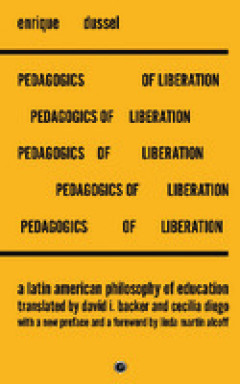
The Pedagogics of Liberation :a Latin American philosophy of education
Enrique Dussel is considered one of the founding philosophers of liberation in the Latin American tradition, an influential arm of what is now called decoloniality. While he is astoundingly prolific, relatively few of his works can be found in English translation — and none of these focus specifically on education. Founding members of the Latin American Philosophy of Education Society David I…
- Edisi
- -
- ISBN/ISSN
- 9781950192281
- Deskripsi Fisik
- 204 p.; 22 cm.
- Judul Seri
- -
- No. Panggil
- 199.82 DUS p
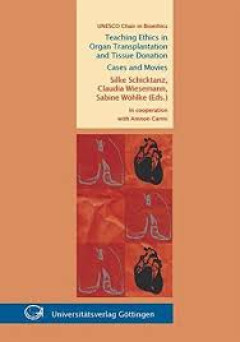
Teaching ethics in organ transplantation and tissue donation - cases and movies
Organ transplantation is a thrilling new option for modern surgery giving hope for chronically ill patients, and, at the same time, stirring controversial ethical questions on human identity and the meaning of the human body. Being a global and transnational endeavor, organ transplantation raises universal ethical concerns and, yet, has to be adapted to culturally mediated believes. In this boo…
- Edisi
- -
- ISBN/ISSN
- 9783941875401
- Deskripsi Fisik
- 88p.
- Judul Seri
- -
- No. Panggil
- 174. 297954 TEA t
 Karya Umum
Karya Umum  Filsafat
Filsafat  Agama
Agama  Ilmu-ilmu Sosial
Ilmu-ilmu Sosial  Bahasa
Bahasa  Ilmu-ilmu Murni
Ilmu-ilmu Murni  Ilmu-ilmu Terapan
Ilmu-ilmu Terapan  Kesenian, Hiburan, dan Olahraga
Kesenian, Hiburan, dan Olahraga  Kesusastraan
Kesusastraan  Geografi dan Sejarah
Geografi dan Sejarah